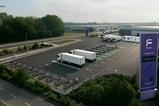Changes to the zero emission vehicle mandate that enable diesel and hybrid vans to be sold until 2035 don’t go far enough and fail to address the practicalities of incorporating EVs into commercial fleets, according to Logistics UK.
Amid US tariffs on cars of 10% and the costs faced by companies to transition to zero-emission vehicles, the government announced it would make the mandate more flexible.
A ban selling new petrol and diesel vehicles will still come into effect in 2030, but manufacturers will now have more flexibility on annual targets and face lower fines.
Logistics UK welcomed the move “in principle”, but deputy policy director Michelle Gardner said significant problems remained:
“Vans are the workhorses of the UK economy, and our members will welcome the clarity today’s announcement gives that petrol and diesel vans can be sold alongside full hybrid and plug-in hybrid vans until 2035,” she said.
“The sector is fully committed to decarbonisation, but commercial vehicles are acquired and used very differently to cars, and zero tailpipe emission vehicles must make commercial and operational sense before businesses can incorporate them into fleets.
“There are still significant barriers preventing more widespread adoption, and our members cite increased vehicle costs, lack of usable public charging, the time and cost of installing infrastructure at depots and higher regulatory burdens.”
Fleet software specialist FleetCheck said the government would almost certainly have to make further revisions to create momentum behind van electrification.
MD Peter Golding said: “The fundamental issues that fleets tell us they are facing when it comes to electric van adoption are that the available vehicles are too expensive, don’t have adequate capacity for their needs, and lack sufficient range.
“The moves that the government has made today don’t go far enough towards tackling these core problems.
“In creating a situation where diesel and hybrid vans can stay on sale until 2035, they’re potentially just giving fleet operators an excuse to continue using ICE vehicles and ignore the issue for a few more years.”
He added: “Today’s revisions are all about supply but it’s arguable that the real problem lies with demand.
“We speak to fleet operators almost every day who are unimpressed by the prospect of electric vans to the extent that their current plan is to operate their existing diesel vans for as long as possible.
“More needs to be done to change this mindset.”
Added Paul Hollick, chair at the AFP: “From a fleet industry point of view, the big news here concerns vans. While electrification of the company car parc has its difficulties – notably around very poor residual values – van electrification is proving much more problematic, with many operators finding current vehicles simply unsuitable for their needs in terms of range, payload and cost.
“The new revisions create a degree of breathing space with diesel and hybrid vans available until 2035. This looks like a more realistic timeframe that will allow ongoing development of new vehicles and a process of adaptation by fleets. However, there still needs to be material, effective incentives for operators to make the transition to electric vans over time, otherwise there is a possibility we are simply kicking the can down the road. The ideas included in the Zero Emission Van Plan we created with BVRLA and others last year should especially be examined.
“Overall though, it’s positive that the government has listened to the fleet and motor industries, made changes to their approach, and appear to be open to making further revisions in the future in response to changing conditions.”


















